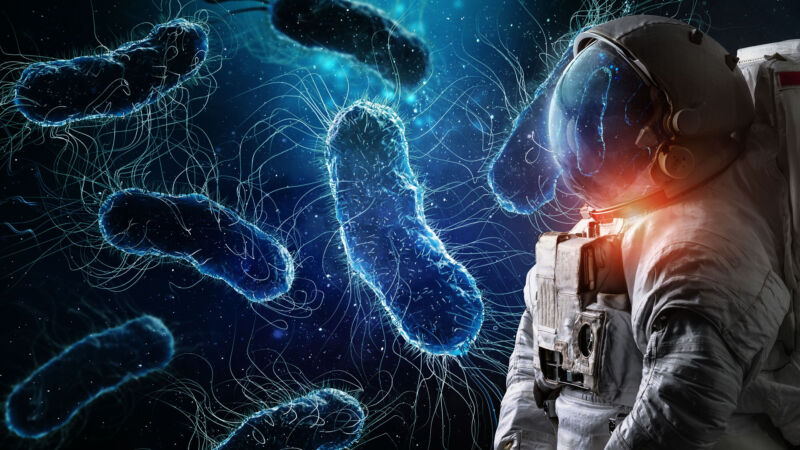
Aurich Lawson | Getty Images
Space poses some huge dangers to humans, from black holes to the heat death of the universe. But as humanity contemplates long-distance space travel, there are other, smaller potential hazards that some researchers believe deserve more attention: Earth’s microbes.
Astronauts face many known health problems in space, including bone density loss, muscle atrophy and psychological problems. And on Earth, researchers are increasingly discovering how the various bacteria and other microorganisms that live inside and outside humans — the human microbiome — affect physical and mental health.
Space is, of course, a very different environment from Earth, with high levels of radiation and microgravity. While the science is far from certain, these huge differences can cause unexpected changes in the astronauts’ microbiome. This, in turn, can lead to a range of health problems, which can be more pronounced during long-haul space travel, such as traveling to another planet.
Still, the implications of a disrupted microbiome are poorly understood, even on Earth, said David Pearce, a life sciences researcher at Northumbria University and author of a 2022 paper examining how a trip to Mars could affect microbes in the gut — increasing their reach. of related diseases and diseases in space difficult to predict. And direct research is limited because only about 600 people have ever been in space. Those who made the trip usually don’t stay long, as the average duration of a trip to the International Space Station is about six months. And some researchers aren’t convinced yet that there’s enough evidence that the human microbiome in space will change much.
Still, many researchers, including Pearce, are trying to figure out whether or not astronauts will enter a state where their microbiome changes in unfavorable ways, called dysbiosis. “Because they’re going to be gone for a long time, will that dysbiosis become a big problem,” he said, “or cause them to have health effects that affect their ability to function?”
Researchers are trying to understand the possible effects of space on the microbiome in two places: terrestrial environments that are somehow similar to those in space, or in space itself. In an example of the former, Norberto González-Juarbe, a principal investigator in the astronaut microbiome research group of the Infectious Diseases and Genomic Medicine Group at the J. Craig Venter Institute, looks at the microbiomes of researchers working at the Concordia and Neumayer stations in Antarctica. He said these locations are partially similar to what astronauts experience in space, specifically the darkness, confinement and limited human contact.
The team plans to analyze samples from the researchers at these stations to see how the microbial makeup of their gastrointestinal tract changes and how their immune systems respond to the space station-like conditions. According to González-Juarbe, early results show shifts in gut microbes, and the team is currently reviewing the immunologic data. He expects to publish the results by the end of this year.
As for studies conducted in space, there are a few. For example, a 2019 study compared the microbiomes of astronaut Scott Kelly and his twin brother, Mark, after the former spent nearly a year on the ISS from 2015. The study stated that Scott Kelly’s microbiome did indeed change in space. For him, this included a reduction in bacteria called Bacteroideteswhose dysregulation has been linked to neurological, immune, and metabolic problems, as well as an increase in Firmicutesa type of bacteria that can help break down certain starches and fibers.
In 2019, another study from the J. Craig Venter Institute looked at nine astronauts who spent between 6 and 12 months on the ISS. The astronauts collected samples from various spots on their skin, nose and tongue. The astronauts also collected fecal matter, blood and saliva, along with samples from various surfaces in the station and water reservoir.
Back on Earth, the study authors extracted and sequenced the DNA from the samples to see how the astronauts’ microbiome changed over time. The study found that several skin microbes, including species Gammaproteobacteria, which the authors theorize could contribute to the general phenomenon of rashes and skin hypersensitivity in astronauts in space. The findings also suggested that the astronaut’s gastrointestinal microbiome changed and that two types of bacteria – akkermansia and ruminococcuswhich appear to play an important role in maintaining mucus integrity in the digestive tract and in breaking down carbohydrates – saw a fivefold decrease.

